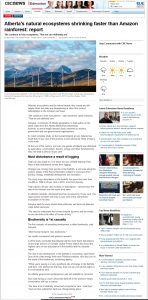Alberta’s ecosystems shrinking faster than the Amazon rain forest? Not true!
On February 7, 2018, the ABMI released a new report on human footprint in Alberta. While some media outlets provided well-informed, balanced coverage of the report, others resorted to sensationalist headlines that unfortunately misrepresented the report’s key findings. The following is the ABMI’s response to this inaccurate coverage.
Bob Weber (The Canadian Press) posted an article on February 7, 2018 titled “Alberta’s natural ecosystems shrinking faster than Amazon rainforest: report” (reproduced at right). The headline is certainly attention-grabbing, but completely misrepresents the facts. When many people just see the sensational headline, we assert it is irresponsible to publish it.
Bob Weber/Canadian Press article on the new ABMI human footprint report, as seen on CBC News Edmonton (Published Feb 7th; accessed Feb 9th).
Let’s talk facts. First, the article doesn’t cite the data used to establish the rates of deforestation in the Amazon rain forest. According to the Brazilian National Institute of Space Research, between 1999 and 2015, an additional 5.2% of the Brazilian Amazon, or 211,000 sq km, was deforested. By contrast, an additional 3.5% of Alberta’s land base, or 23,000 sq km, was impacted over this time frame. Bottom line: the amount of land transformed in the Brazilian Amazon is 10 times higher than what has occurred in Alberta, and the rate of transformation is faster than Alberta’s.
Second, the headline suggests that deforestation in the Amazon is comparable to forest management in Alberta. That’s also not true. While 211,000 sq km of land was lost to deforestation in Brazil, forestry practices in Alberta require reforestation. According to the Government of Alberta, “Under Alberta law, an FMA (forest management agreement) holder is responsible for the planning and reforesting after harvest. Reforestation efforts must be completed within two years of harvest and must take place in all areas where timber is harvested”. By contrast, according to a 2006 United Nations Food and Agriculture Organization report, 91% of the land deforested in the Amazon since 1970 had been converted to livestock pasture resulting in the loss of forest ecosystems (3).
The Amazon is losing an alarming percentage of its forests while in Canada we cut and re-grow forests. In fact, it’s a stretch to call the deforestation in the Amazon “forestry”.
Deliberately misrepresenting or sensationalizing the facts causes harm to Alberta’s reputation, and more importantly, the people in this province who work in the forest and in other natural resource industries. ABMI staff members who work day-in-and-day-out to collect and report on scientifically credible data on Alberta’s species and their habitats have had the outcomes of their work twisted. An apology and retraction are due.
The Facts
In recent decades, Alberta has emerged as a leader in environmental science and monitoring. We have fantastic scientific information and it is being made available through governments, industries, and monitoring organizations. This scientific information is used to make more informed decisions about our environment, from wetlands to forests—that is the real story behind the new ABMI report.
The ABMI is just one of the monitoring organizations committed to providing open access to knowledge. As an arm’s length, independent, scientific organization, the ABMI goes to great lengths to ensure our reporting products are fair and value-neutral. We do not advocate for or against any management outcome, conservation effort, or industrial activity. However, when someone distorts the facts, we have an obligation to set the record straight. For the facts on the current state and trend in footprint in Alberta, please review the recent human footprint report. For more information on the ABMI, or to view our many other data sets and derived data products, please visit our website.
